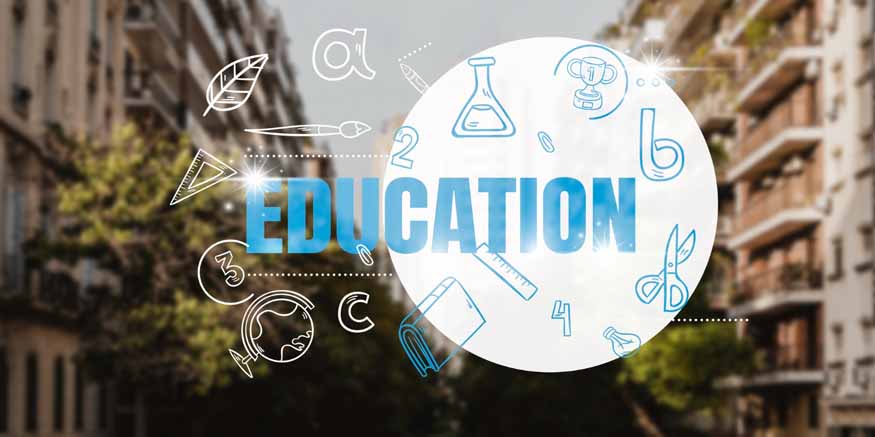There are more than 300 prominent competitive exams after 10th in India. More than 3 crore candidates appear every year for competitive exams such as UPSC, JEE, NEET, NET, NDA, CAT, IES, CLAT, CA, and AIIMS. These competitive exams after 10th open up lucrative career opportunities for students in the fields of engineering (JEE), medicine (NEET), public service (UPSC, IES), teaching (NET), Law (CLAT), Accountancy (CA), and Banking (SBI PO, IBPS PO, RRB etc.). Most of these exams are open to students passing out of class 10th, and some require an undergraduate qualification. These exams are very competitive and require a lot of discipline and hard work on behalf of the students to clear these exams.
Due to the high degree of competitiveness in these exams, most students start preparations for these from class 11 onwards, if not earlier. As a result, students need to prepare for these exams in parallel to their school. In such a scenario, if there is close synchronisation between the school curriculum and the competitive exam curriculum, it makes the students’ tasks that much easier. Most reputed schools these days actively support students by helping them prepare for their competitive exams such as JEE, NEET, and CA. However, it is still important to look at various boards and evaluate which board suits you the best in terms of your preparations for your chosen competitive exam.
Indian education spectrum is a mix of:
- Central Board of Secondary Education (CBSE)
- Council for the Indian School Certificate Examinations (CISCE)
- State Boards
○ Currently there are 32 state education boards in India
- International Baccalaureate (IB)
- Cambridge Assessment International Examinations (CAIE)
○ The CAIE offers IGCSE (International General Certificate of Secondary Education) as a globally recognized qualification for students in the age group of 14-16 years.
CBSE vs ICSE Boards
CBSE and ICSE, the two national boards, are the most popular in India. They offer streams in:
- Science
○ Medical
○ Non-medical
- Commerce
- Arts/Humanities
CBSE is the most popular board in India. About 38 lakh students reportedly appeared in the 2023 board exams. Reportedly there are 20,000+ schools affiliated to the CBSE board in India. Compared to this, CISCE is a distant second with 2,213 schools, Cambridge with 310 schools, and IB with 141 schools. CISCE is India’s largest privately run board and is popularly believed as the toughest board in India.
Following are some of the features for each of these boards which might aid students to choose a suitable board to prepare for competitive exams after 10th.
Significant Pros in favour of the CBSE board
- CBSE is relatively less rigorous and has high scoring as compared to ICSE and IB. This makes scoring marks relatively easier which could be a big advantage
- More Scoring: CBSE is high scoring as compared to ICSE and IB boards. This makes scoring marks relatively easier which could be a big advantage for students as 10th and 12th marks are a significant component of the selection and eligibility criteria for most colleges.
- Conducive Syllabus: CBSE follows the NCERT syllabus which has a strong sync with most competitive exams. It is also a good mix of theory and application which can be extremely useful for competitive exams for engineering, medical, and commerce students. Recommended Books There is a strong overlap between the NCERT books used in the CBSE board and the books recommended for competitive exams, especially for JEE and NEET. This is especially helpful for students to prepare themselves for pan-India competitive exams after 10th along with state-level entrance exams. Transferability CBSE is the most affiliated board in India. This allows for easy transferability for students whose parents might be in transferable jobs. Competitive exams typically are a long-term journey and this acceptability pan-India might be a significant plus in favour of the CBSE board.
Significant Cons against the CBSE board
- The only plausible con against the CBSE board is the lack of depth in education. The focus is largely on the question-and-answer format. The syllabus lacks in-depth as compared to CISCE. These aspects may not be significant from a competitive exam level but might be crucial in the long run career progression.
Significant Pros in favour of the ICSE board
- Toughness is Good: ICSE is believed to be the toughest and most in-depth curriculum post-class 10th. While this might seem to be a disadvantage, an alignment with engineering, medical and commerce exams will help students as their preparation happens while studying in class.
- In-depth: ICSE is known to be more in-depth in terms of the topics taught under each subject. This ensures a robust foundation for students which holds them in good stead not just for competitive exams after 10th but also in the long term.
Significant Pros in favour of the IB board and IGCSE board
- International Recognition: IB is an internationally accepted and recognised board. It is especially helpful to students willing to keep their options open to study in international colleges and universities. Acceptability of IB is much higher abroad as compared to the other boards in India.
- Variety in the Curriculum: IB and IGSCE board offer a vast variety of curricula which is largely positioned for the affluent section of Indian society. This helps in the holistic development of children.
- Preparatory Support: International curriculum-driven IB and IGSCE schools with their vast resources do focus exclusively on helping students prepare for prominent competitive exams such as JEE and NEET.
Significant Cons against IB and IGCSE board
- Expensive: IB and IGCSE education is expensive and could be a significant strain on middle-class families.
- Acceptance in India: IB’s acceptance in India is still limited when compared to CBSE and ICSE boards. However, this aspect is changing rapidly.
- Education in India:IB’s limited acceptance in India makes it less suitable for those students interested in pursuing higher education in India.
Also Read: What is IB Board in India?
State Boards
State boards have a special emphasis on regional languages and culture in their educational curriculum. Most states follow their own curriculum, however, some states have adopted the government-prescribed NCERT curriculum to help students prepare for pan-India competitive exams. State boards also focus on helping students prepare for state-level engineering and medical entrance tests.
Following are some of the features of state boards which might aid students in choosing a board most suitable for competitive exams after the 10th:
Significant Pros in favour of state boards
- Light syllabus: As compared to national boards, state boards typically have a lighter syllabus and a lesser number of subjects. State board students will typically have more time on their hands to prepare for the competitive exams of their choice.
- Lenient Attendance Requirements: Most state board affiliated schools have lenient requirements on attendance. This along with a lower number of subjects gives a lot of extra time to the students to focus on their preparations for competitive exams after 10th. Low Cost: State board schools are usually government funded and thus are more economical in terms of the cost of education. They are also relatively less ‘commercialised’ as compared to the CBSE, ICSE, IGCSE board and IB boards.
Significant Cons against state boards
- Strict Marks Allocation: Most state boards are known (or rather notorious) for being too strict with the award of marks. National boards such as CBSE and ICSE on the other hand are known for comparative leniency in awarding marks to students. This usually comes across as a big hindrance to state board students to compete as various entrance procedures consider class 10th and 12th marks in their selection processes.
- Quality of Education: Due to the ‘governmental’ pace of working, the curriculum updation, quality of school infrastructure, and quality of teachers are usually found lacking in schools associated with state boards. The syllabus is usually outdated and may not be in sync with the evolving syllabus of competitive exams.
- Medium of Education: Focusing on the local language does take the priority away from English as a professional language. In the long run, this leads to state board students being disadvantaged as compared to other board students as most pan-India competitive exams have English as a component of the test or the interview process.
EuroSchool understands the aspirations of its students and takes great efforts in aligning the curriculum and teaching activities with the students’ preparations for their competitive exams. Our chain of schools is affiliated to the CBSE, ICSE and sIGCSE boards. Get in touch with us to know more about how our special preparatory sessions are organised for students preparing for prominent competitive exams.









